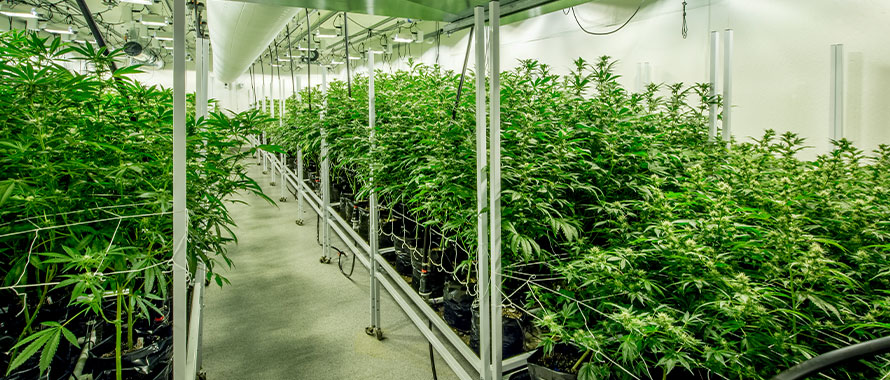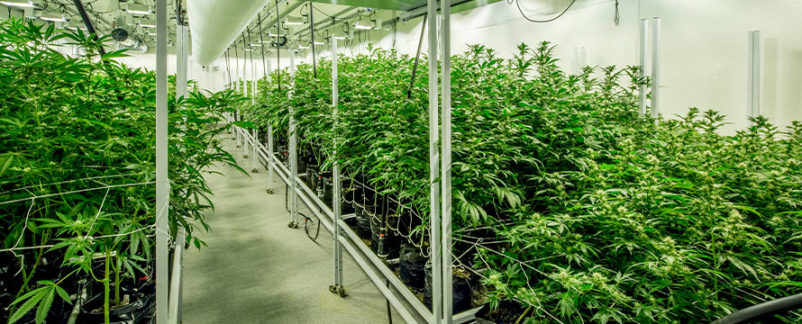The U.S. cannabis market is rapidly expanding with more states legalizing recreational use and an array of new products being produced every year. Rhode Island became the 19th state to legalize safely regulating recreational adult-use cannabis in May 2022. Several states such as Alabama, Arkansas, Florida and Pennsylvania have legalized cannabis for medical use only.
Cannabis has been legal in Canada since 2018 with additional classes becoming legalized a year later.
The significant increase in cannabis businesses of all types throughout North America have opened operators up to new risks and liabilities. Cannabis providers, growers and dispensaries hire such experts as industry consultants and security personnel with specialized skills and knowledge. Producers and growers invest in high-tech equipment and heavy machinery, which establish additional risks, especially when employees are operating this equipment.
With this investment comes innovation designed to expand product reach. One new trend in the U.S. is the opening of retail consumption lounges in such states as California and Nevada. These consumption lounges allow guests to consume cannabis products in a bar-like setting, which comes with a higher risk profile. There are countless other examples of the collective entrepreneurial focus the cannabis operators have, but many are first-time business owners who are still learning the intricacies of running a company.
Newer derivatives like Delta 8 THC and Delta 9 THC are regularly entering the market. THC is the marijuana plant’s primary component for causing psychoactive effects. Both offer benefits to some individuals, such as better sleep, controlling appetites and more.
Additional trends are highlighted throughout the remainder of this report.
Trends and Differences in the Canadian Market
While the federal government in Canada has legalized recreational use, consumption in public spaces is generally not allowed. Consumption lounges for example are illegal. Seven classes of cannabis products may be sold to consumers in Canada, including dried cannabis, cannabis oil, cannabis plants and plant seeds, edibles and concentrates. Producers are in the midst of a huge growth spurt of new product development that fit into these classes.
Several research studies in Canada indicate that gummies and baked goods are preferred methods of consumption for residents, therefore many new entrants specialize in these spaces. Yet many metro areas have cannabis markets that are extremely saturated with dispensaries opening within walking distance of each other. This has caused massive turnover in the industry. Dispensaries that effectively market and operate survive, while many others are forced to exit the industry.
This is one of many reasons why accurate coverage is necessary for these producers. Regular check-ins and scheduled meetings between brokers and their clients are the best ways to keep track of client assets on hand. Additionally, cannabis is considered a specialty market in Canada rather than a standard risk.
Insurance policies in the cannabis industry are available for personal growers, commercial cultivators and processors and retailers. Up to four plants can be carried on a client’s Homeowners policy, once you pass this, the risk no longer qualifies for standard market placement. Even specialized Premises Pollution, Fire Exposure and Environmental Cleanup coverages are available from Burns & Wilcox’s team of Environmental experts. Burns & Wilcox’s full-service team in Toronto can answer any questions you may have. Our team specializes in getting renewals and new policies finalized quickly, often within 60 days.
Thorough submissions with detailed financials are recommended and becoming a requirement. Underwriters in Canada are often looking for profit worksheets, biological asset worksheets, statements of value, building appraisals, and marketing materials and more to prove a reduced opportunity for risks.
Submission quality is increasingly important
A theme we espouse in most lines of business is the need to submit fully completed, high-quality submissions for new or renewal coverage, and the same is true in the Cannabis sector. Although capacity is available, the fight over the best terms is competitive as new companies and individuals enter the market regularly.
In fact, the volume of submissions is so large that submission burnout is a real issue with underwriters, making it even more critical to have yours stand out from the crowd. Working with a specialist at Burns & Wilcox helps brokers and agents to know how best to present their client. We can help you ask the necessary questions to better understand if your clients are coverage conscious or are simply fulfilling a requirement. By understanding your client’s goals, Burns & Wilcox professionals can identify the data needed in a submission to secure competitive and appropriate coverage.
Suggestions to support a growing cannabis business
The legal cannabis industry is still young and many rules and regulations at state and local levels will continue being established, causing confusion for operators, producers and sellers. Turnover is common and expected.
Burns & Wilcox offers the following suggestions for brokers and agents expanding their book of business in this market to help their cannabis clients thrive:
Quarterly check-ins with clients are necessary. Astronomic growth also means significant turnover of existing businesses. A quarterly check-in with cannabis clients may help identify issues before they threaten the health of the business. These meetings can also uncover coverage gaps that could decimate a business if an expensive claim is required.
Manage client expectations. Find out what matters to your clients and pair that with the right carriers and policies to fit those needs. Many operators in the cannabis space are new to the entrepreneurial scene so walking them through the process supports client retention and satisfaction efforts.
Take advantage of increased carrier competition for business. Work with your industry contacts and ask for help from Burns & Wilcox’s experts to see if increased coverages and enhancements can help sweeten the policy mix.
“Clean” submissions provide extensive value. All submissions should include business plans, financials and extra details. With this information Burns & Wilcox can help you control the narrative for underwriters on behalf of your clients.
Do not let evolving laws and regulations in the cannabis field overwhelm you. Burns & Wilcox can help you resolve hard-to-place risks and even find subject matter experts to provide the information needed to make an informed decision. We take a risk adverse approach to building options while still having the ability to secure top-line coverage.
Relationships within the industry matter – so use all resources to build them. By effectively using your network contacts and ones Burns & Wilcox provides you will be in a better position for competitive quotes, favorable terms and conditions, a quick response and reliable risk assessment.
Burns & Wilcox offers in-house, often same-day binding market. We also work with sister company Stonemark to provide cannabis-related financing in the U.S. and Canada. This is valuable because regulated banking institutions are prohibited from closing deals in the sector.
Contributor(s): Jason Scheurle, National Product Leader, Cannabis, Burns & Wilcox; Emily McDaniel, Broker, Commercial Insurance, Burns & Wilcox; Leena Malik, Senior Underwriter, Commercial Insurance, Burns & Wilcox Canada; Cooper O’Connor, Senior Broker, Professional Liability, Burns & Wilcox Brokerage
This commentary is intended to provide a general overview of the issues contained herein and is not intended, nor should it be construed, to provide legal or regulatory advice or guidance. If you have questions or issues of a specific nature, you should consult with your own risk, legal, and compliance teams.










